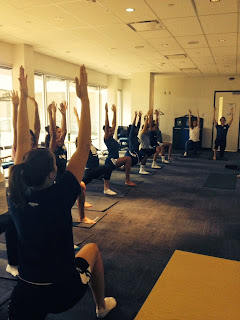 Mindfulness is an important developmental focus of our Warrior Training Leadership Program. In particular, our Yoga sessions helps to quiet the mind, help to develop the awareness people need to recognize the desire/need for change. Once awareness is developed there is generally less resistance on the path to change.
Mindfulness is an important developmental focus of our Warrior Training Leadership Program. In particular, our Yoga sessions helps to quiet the mind, help to develop the awareness people need to recognize the desire/need for change. Once awareness is developed there is generally less resistance on the path to change.The leader of our Mindfulness Development initiatives wrote the letter below to the Ryerson University Women's Basketball team prior to their session today. The letter provides clarity on the reasons why yoga is a very important component to their leadership development. I thought it super insightful and connected with the purpose for our Warrior Training that I wanted to share it with the followers of ttheMOVEMENT. Enjoy!
Why Do We Do Yoga Anyways? Why Don't We Just Stretch?
It's an interesting topic. Why do we do up-dog, down-dog, side-half-umbrella dog? Why not just stretch? Well, you see, because the physical practice of yoga is merely a piece (and a small one at that) of what yoga really is. In fact, yogis started to practice the physical postures of yoga so that they could meditate for longer.
There is a cool thing that happens when you step onto the mat. You are instantly driven inwards into that chaotic, rat-race of a brain and forced to look at yourself. For people just starting out, it's typical that they avoid this process by getting really competitive or joke around, but eventually something happens as you continue to practice...you're brain shuts off and you are left with just you. Not you plus the bullshit (oh my god I have a test, why did Angela say that about me, do I look fat...), just you. This inner connection with self begins to open you up to a higher consciousness which eventually spills out into your life.
Don't believe me? That's fine. Meet me on the mat.
Each posture does one of two things:
1. It exposes something about your personality. So for example, if you hate backbends you might ask yourself why you don't like being vulnerable and opening your heart freely. Or, if you can't hold a balancing pose as well as you usually do, what is distracting you in you life right now?
2. It brings energy into your world. Example: As you hold postures that burn like crazy, and keep you holding it even though you feel like your legs are going to explode!!! This translates into us having the confidence to keep going when life gets tough.
This may be a lot to swallow, maybe not. All I know is that it also happened to me. Despite just wanting to do yoga for the hot ass, it eventually connected me to my spirit, and I began to see the world and other people differently. I became a better version of myself; stronger, more flexible in my thinking and decision-making, calmer, and more and more and more.
It is absolutely okay to come to yoga just to relax, but I just wanted you to know that there is a magic to it. If you keep up with it, not only will it transform your body, it will transform your life. Yoga is not a religion or a path- not in the Western world anyway. However, it will lead you to a path, one that will bring you endless fulfillment and joy.
Rock on friends.
Namaste,
Sarah Amaterasu Hauch xo





